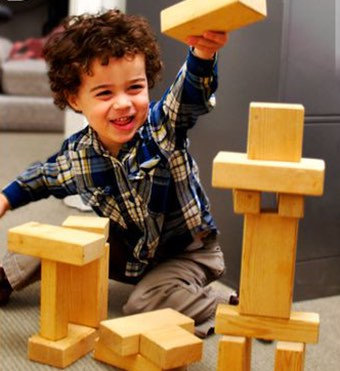What are the cognitive capacities of infants and how do they develop through early childhood? The answers to these questions may shed light on the fundamental cognitive systems that organize human knowledge and support learning through adulthood. But how is it possible to probe the knowledge of infants, given their limited ability to communicate that knowledge? This unit introduces behavioural methods used to study early cognitive development and examines what these studies reveal about the evolution of infants’ understanding of objects, agents, and causal relations, and how young children learn by engaging in a process of directed discovery.

How does a child develop the knowledge of physical objects and their behaviour needed to create a simple stack of blocks? Innovative methods to probe infants’ knowledge of the world, advanced by Liz Spelke, Laura Schulz, and others, have led to insights about the nature of this evolving knowledge that enable Josh Tenenbaum and others to build models of how children learn how to reason about the physical world.
Part 1 of Liz Spelke’s lecture introduces the general looking paradigm for studying infant cognition and explores infants’ understanding of objects, their motions and physical interactions, and the representation of properties such as object cohesion, permanence, and solidity.
In Part 2, Liz Spelke explores the concepts of gravity, compositionality, and causality, and how these concepts develop over the first year of life. The lecture then turns to infants’ understanding of agents that can initiate goal-directed actions, and how cues such as the direction of a person’s gaze can signal social engagement with the infant.
From Alia Martin, you will learn how infants and young children develop an understanding of communication between agents, including the role of cues such as speech and direction of gaze, and their capacity to infer an agent’s intent and incorporate this knowledge into their own actions.
The way a child acquires new concepts that enable them to predict and explain the behaviour of the physical and social worlds resembles the way a scientist develops new theories in the process of scientific inquiry. Laura Schulz shows how children, for example, use statistical evidence to make generalizations and causal inferences, engage in selective exploration to disambiguate causes and effects, and weigh the utility of their actions for information gain.
Jessica Sommerville explores infants’ ability to register the costs and benefits of an agent’s actions and use this information to guide their own prosocial behavior.
Returning to the idea of building models of the world as generative probabilistic programs, Josh Tenenbaum shows how this framework captures how new object concepts can be learned, and how the fundamental structure of knowledge in a new domain may be discovered through a process of stochastic search.
Finally, a lively debate between Tomer Ullman and Laura Schulz pushes the limits of our understanding of how children generate new ideas and refine their theories about the world through exploration and experience.
Unit Activities
Useful Background
- Introduction to cognitive science
- Lectures by Josh Tenenbaum from the Modeling Human Cognition unit provide useful background for the lecture by Josh Tenenbaum in this unit, and for the debate between Tomer Ullman and Laura Schulz
